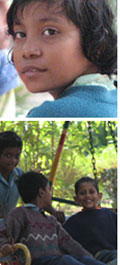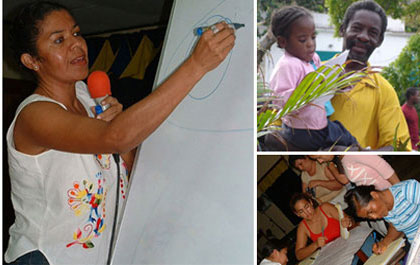






Alternative economies
ISHD’s work focuses on the development of alternative economies characterised by democratic control and cooperative solutions. Here is some of our work in this area:
Millennium Development Research Grant 2011, Shastri Indo-Canadian Institute: Sustainable Value Chains as viable development strategy
The global economic crisis has posed new challenges for realizing MDGs. As the MDG report 2009 outlines, poverty, accompanied by the extreme vulnerability of employment options, is threatening to reverse many of the gains made in the MDGs. In India, despite commendable economic growth, 41.6 percent live under $1.25 a day, 75.6 percent live under $2, and some 37 percent under the national poverty line. national poverty line. According to the ILO, more than half of the global workforce toils in insecure jobs. India’s export sectors are prime examples of this phenomenon. Alongside spectacular growth and profitability, employment in these sectors remains highly insecure, low paying and exploitative. A central feature of this process is the employment of young women. Despite their much-celebrated inclusion in the workforce, studies uniformly show that export sector growth has been far from MDG-friendly, particularly with respect to gender (UNCTAD 2008). The greatest challenge, as the MDG Reports repeatedly point out, is to develop models of sustainable production and trade which provide alternatives to these exploitative forms of work. In this context, our research examines the potential of social economy enterprise for realizing MDGs. ‘Social economy enterprises’ are organizations which provide goods or services, but do so with an explicit social purpose. They give equal priority to their social/developmental goals and their financial goals. Social economy enterprises are increasingly recognized as important tools for development. But they face numerous challenges, particularly in the aftermath of the crisis. What are these challenges? What obstacles do they encounter in the market and how can they be addressed? While we know some success stories, we do not yet have clear strategies to scale up these successes and maximize their development potential. The main purpose of this project is to analyze this dimension. By engaging with enterprises, government and civil society actors, our research aims to build new knowledge on the potential of SE enterprises for realizing MDGs.
Community-University Research Alliance for Southern Ontario’s Social Economy: The Alliance grew out of Social Science & Humanities Research Council of Canada (SSHRC) award of 1.75 million for the Ontario Social Economy Node headed by the Social Economy Center, University of Toronto. It consists of a network of leading scholars from 11 universities in Southern Ontario, 22 partner organizations, and scholars from seven universities external to the node whose research will be beneficial to this initiative. The York team, consisting of Profs. Darryl Reed, JJ McMurtry and Ananya Mukherjee Reed, is responsible for the following three sub-projects:
Internationalizing The Social Economy Through Fair Trade: An Action Research Project
The basic purpose of this project is to investigate the problems involved in social economy enterprises undertaking initiatives to develop new fair trade products and the conditions for success. This work focused on the efforts of the Sumac Co-operative – located in Guelph, Ontario – to develop new fair trade products in co-operation with local partners in the Indian state of Kerala, a state known historically for its alternative approaches and experiments. We have examined, through an action research methodology, to analyse the nature of problems (technical, financial, organizational, political-bureaucratic, social) that arise in these endeavours, as well as the measures we can employed to address them.
Fair and Ethical Trade, Public Policy and the Social Economy – The overarching objective of this project is to explore the role of procurement policies in promoting the Fair and Ethical trade movements and their underlying goals of improving the living standards and working conditions of vulnerable and marginalized workers in the South. In particular, the project will look at three basic public realms where policies have been developed, viz., school board, universities and municipalities.
Life Capital Social Economy Project – The core objective of this project is to provide a theoretical and practical framework for evaluating the social, as well as the economic, capital of social economy institutions. Specifically it aims at uncovering the pre-existing social, cultural and political frameworks which provide the background upon which all economies, and specifically social economies, rely upon to develop their economic goods. To achieve this goal investigations will be undertaken in a range of communities with distinct social economy institutions and cultural conditions. The initial three sites of investigation will be in Ontario with the Mennonite community in St. Jacobs, the Wikwemikong First Nation on Manitoulin Island and FoodShare’s “From Field to Table” project. After this initial Ontario testing, various other sites across Canada will be examined in comparison to identify different life capital capabilities in various regions and in order to establish national life capital characteristics.
Development in the aftermath of the global meltdown: Can sustainable value chains provide an appropriate strategy? Funded by the Shastri Indo-Canadian Institute (SICI), Calgary, the main purpose of this project is to develop a long-term collaborative research program involving Center for Development Studies (CDS), Kerala. In addition, several other civil society organizations and social enterprises will be involved. The research program will focus on challenges posed by the global economic crisis for realizing the Millennium Development Goals (MDGs), and possible strategies for addressing them. In contrast to conventional chains, sustainable value chains (SVCs) are networks in which the interests of small producers and the workers are prioritized. Sustainability can have both social and environmental dimensions. The latter refer to the extent to which the products/processes associated with the chain are ecologically appropriate. Social sustainability is a more complex notion, less systematically treated in academic and policy discourse. A value chain to be socially sustainable if: (a) it is democratically organized; (b) it does not create any dependence between different participants in the value chain or on an external agency; and (c) it engenders equitable rather than hierarchical relationships between different participants in the value chain.
Our particular concern is the gender dimension: can norms and structures associated with SVCs enable women to challenge power asymmetries and overcome the cycle of vulnerable work and poverty? What evidence do we have in this regard? Second, how can SVCs impact other MDGs such as environmental sustainability and poverty reduction? As a case study, we will focus on cotton textiles, for three main reasons. First, it is one of India’s major export sectors – one critically impacted by the meltdown. Second, this sector is one of the largest employers (especially of women) and is connected to the ongoing crisis in cotton (indicated by the 200,00 farmer suicides). As such, insights generated from this research have much broader significance. Third, there exists an established literature on conventional textile value chains, the dominant role of corporate actors, and its negative impact on MDGs. By contrast, there is relatively little until now by way of literature or actual experiments in value chains where non-corporate, civil society actors can fully participate. Our research aims to systematize and build new knowledge to contribute to the key policy debates on value chains, market inclusiveness and MDGs.
Business, Development and the Social Economy: The aim of this project is to critically examine the problematic of regulation of business and its relationship to development. The first of a series of initiatives in this theme was a workshop and conference on public-private partnerships and sustainable development. The papers from this conference have been published in a special issue of the Journal of Business Ethic in 2008. The second was a workshop at York University in September 2008 entitled Non-state regulation for development: Prospects for Social Change? A co-edited volume on this topic is to be published by Routledge in 2011.
Grassroots networks and women’s struggle against poverty: A study of the Women’s Development Network (WDN) in Costa Rica, 2006-09
Through a case study of the Women’s Development Network (WDN) in Costa Rica, this project attempts to examine the potential of grassroots networks and reciprocal exchange relationships among women as a survival strategy and a form of agency. WDN is a network of 1586 women’s groups drawn from different Latin American countries. It is based on the hypothesis that overcoming isolation (geographic, economic, social, intellectual) is key to the struggles of its members; thus WDN regards mechanisms of solidarity, exchange of information and collective forms of organization as important tools in the struggles of its members. While there is enormous diversity among WDN members, this research will focus on women who are typically between 25-45 years of age; have primary education; have the responsibility of supporting 3-5 children each; and live in a rural/semi-urban area with limited access to transportation and services. Their principal difficulty is to identify a sustainable means of subsistence, by utilising their skills and resources and in a manner that affirms their human dignity. Their participation in the network is a concrete response to their lived reality of poverty and marginalisation. While it is true that WDN’s membership has grown and is steadily increasing, it is critical at this point to develop a systematic understanding as to exactly how it is aiding its members in fulfilling their goals. This project is an attempt to document and analyse these experiences.
Links
- Award 2011: Millennium Development Research Grant, Shastri Insitute (SICI), 2011
- Constructing a North-South Knowledge Community: Social Science & Humanities Research Council Canada (SSHRC), award 2010
- Development after the Global Meltdown, Shastri Insitute (SICI) award, 2009
- Recent publications by ISHD members
- Universitas Forum, an international journal